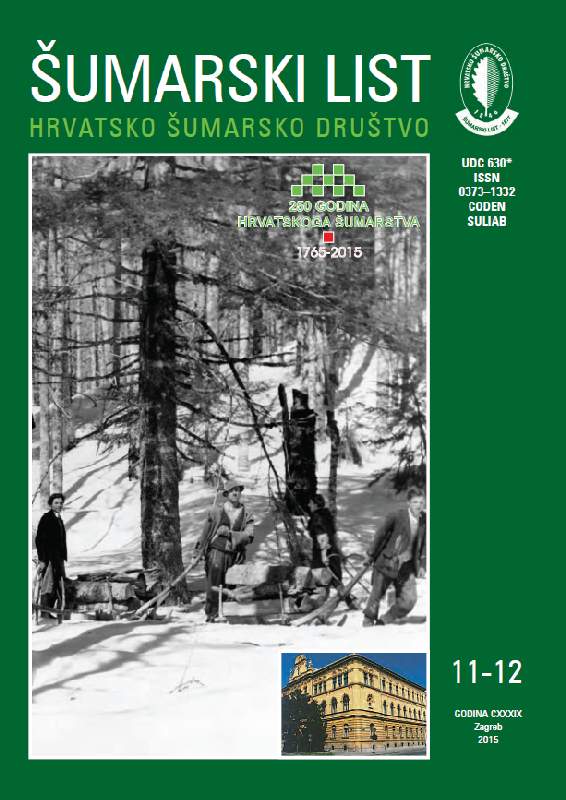
broj: 11-12/2015
pdf (10,08 MB) |
|
||||||||||||||
| RIJEČ UREDNIŠTVA | ||
| Uredništvo | ||
| AT THE END OF THE YEAR pdf HR EN | 495 | |
| IZVORNI ZNANSTVENI ČLANCI | ||
| Ivica PAPA, Tibor PENTEK, Hrvoje NEVEČEREL, Kruno LEPOGLAVEC, Andreja ĐUKA, Branimir ŠAFRAN, Stjepan RISOVIĆ | UDK 630* 383 +386 (001) | |
| THE ANALYSIS OF THE TECHNICAL FEATURES AND DRAINAGE SYSTEM FOR EXISTING FOREST ROADS IN ORDER TO ESTABLISH THE NEEDS OF THEIR RECONSTRUCTION – A CASE STUDY pdf HR EN | 497 | |
| Dalibor BALLIAN, Benjamin JUKIĆ, Besim BALIĆ, Davorin KAJBA, Georg von WÜEHLISCH | UDK 630* 181.8 (001) | |
| PHENOLOGICAL VARIABILITY OF EUROPEAN BEECH (Fagus sylvatica L.) IN THE INTERNATIONAL PROVENANCE TRIAL pdf HR EN | 521 | |
| Vesna KRPINA | UDK 630*272 + 934 + 468 (001) | |
| ANALYSIS OF THE RELATION BETWEEN VISITORS AND PROTECTED NATURAL AREAS IN THE ZADAR COUNTY pdf HR EN | 535 | |
| Omer KUCUK, Ertugrul BILGILI, Paulo M. FERNANDES | UDK 630* 431 (001) | |
| FUEL MODELLING AND POTENTIAL FIRE BEHAVIOR IN TURKEY pdf HR EN | 553 | |
| PREGLEDNI ČLANCI | ||
| Julije DOMAC, Stjepan RISOVIĆ, Velimir ŠEGON, Tibor PENTEK, Branimir ŠAFRAN, Ivica PAPA | UDK 630* 537 + 831 | |
| CAN BIOMASS TRIGGER AN ENERGY-WISE TRANSITION IN CROATIA AND REST OF SOUTHEASTERN EUROPE? pdf HR EN | 561 | |
| Summary Through the history of mankind, until the mid-19th century, biomass, particularly wood, represented the most important source of energy. In many countries of Europe, the awareness of the importance of forest biomass as fuel has been closely connected to the general understanding and the realization of own and world energetic situation. Forest biomass represents an important source of energy, whose use should be paid more attention to in the future. In its traditional forms, biomass is still a very significant source of energy in most countries of the southeast Europe and it will continue to be so in the near future. However, it is more and more used not just for thermal energy production, but also for the production of electric and cooling energy which is considered as an important part of the energetic transition which is a promising model with high economic and ecological advantages. The use of biomass energy offers significant possibilities for opening new jobs, thus having a significant positive impact on the local and national economy. This paper describes the present stage of the energetic transition in the south-eastern European countries and the role of forest biomass in its implementation. Examples and events in Albania, Bosnia and Herzegovina, Croatia, Macedonia, Kosovo and Serbia are analysed. Rural development projects as well as the use of bioenergy biomass has a great potential for income generation, increase of productivity and opening of small village companies. From the macroeconomic perspective, the use of biomass contributes to all the important elements in the development of the south-eastern European countries. Key drivers as well as the obstacles which can be encountered in the energetic transition in local government units can be structured as follows; potential stimulus, refers to the most south-eastern European countries regarding their significant afforestation and forest biomass potential, market stimulus due to cost-effective accessible plants and equipment for biomass, as well as the adequate support of manufacturing firms, the use of commercial and business connections: where most of biomass trades among the south-eastern European countries and EU is carried out in integration with the forest product trade, to be first or the local pride, is an important driver in the south-eastern European countries to keep money at home is another important link with the positive perception in the use of the forest biomass. The paper recognised a significant number of potential groups of obstacles for using the forest biomass; economic limitations more favourable price of the forest biomass energy in relation to fossil fuels, financial limitations as a serious obstacle for each form of the renewable energy, social limitations are very specific for each form of the renewable energy, human resource limitations since most local governments do not have sufficient human potential, limitations due to transparency are a very frequent problem, primarily depends on the democratic power, technical limitations mostly belong to the fact that most of the equipment for using renewable energy sources and the increase in energetic efficiency from the import, has not been produced on the local level. Key words: Bioenergy; South-East Europe; Socio-economic drivers; People; Energy transition | ||


